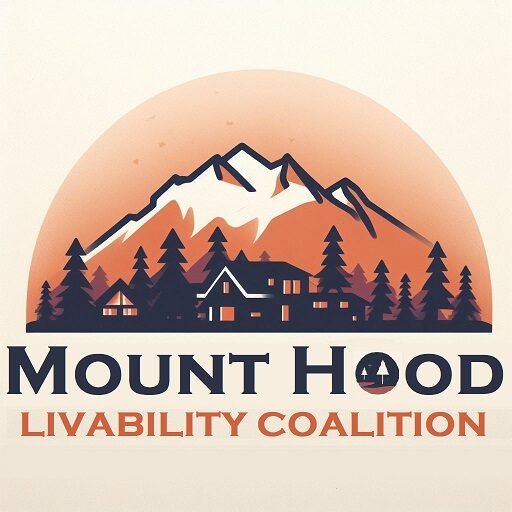November 3, 2025
Dear Mountain Community,
The Mount Hood Livability Coalition, in partnership with the Hoodland CPO, has submitted a comprehensive formal request to the Clackamas County Board of Commissioners calling for immediate implementation of enforcement mechanisms under the existing Short-Term Rental regulations.
After nearly two years of the STR pilot program operation, it has become clear that the regulatory framework exists on paper but lacks any meaningful enforcement. While the County has successfully collected registration fees and transient lodging taxes, the enforcement provisions explicitly written into County Code Chapter 8.10 have never been activated.
The Heart of the Issue: Rules Without Enforcement
Our formal request, submitted today to Chair Roberts and the Board of Commissioners, documents systematic non-compliance with mandatory requirements under the existing STR ordinance. The problem isn’t the absence of rules—it’s the complete absence of enforcement.
Consider these examples from County Code Chapter 8.10:
Posting Requirements (Section 8.10.050(I)): The law requires that contact information and registration numbers be “posted in an area and size to be readily visible from the nearest public roadway” when guests are present. Community monitoring reveals widespread non-compliance, yet no enforcement actions have been documented.
Progressive Enforcement (Section 8.10.080): The ordinance establishes a clear structure requiring written warnings followed by formal enforcement actions, including suspension and revocation of registrations. Despite hundreds of registered rentals and ongoing community complaints regarding noise, parking, and occupancy violations, no warnings, suspensions, or revocations have been issued.
Examination Authority (Section 8.10.060): The County has explicit legal authority to examine STR premises “at any reasonable time” for compliance verification. This authority has never been exercised.
What We’re Asking For
The Mount Hood Livability Coalition is not requesting new regulations or additional restrictions. We’re asking the County to enforce the laws already on the books. Our formal request outlines four specific implementation measures:
1. Dedicated Staffing: Allocate one full-time Code Enforcement Officer position specifically for STR compliance, funded by increasing the current administration fee from 0.85% to a rate sufficient to support this position.
2. Proactive Monitoring: Implement quarterly compliance verification including physical checks of posting requirements, platform monitoring for proper registration display, and annual safety equipment verification.
3. Technology-Enhanced Enforcement: Contract with third-party monitoring services to identify unregistered STRs and verify compliance with advertising requirements, following successful models used in Portland and Santa Fe.
4. Emergency Authority Activation: Immediately activate the existing emergency revocation authority for documented fire safety violations, particularly critical given our high wildfire risk environment.
A Timeline for Accountability
We’ve proposed a concrete implementation timeline with measurable milestones:
- 60 Days: Hire dedicated enforcement officer, establish monitoring contracts, begin systematic review of registrations
- 90 Days: Launch proactive compliance monitoring and issue first round of violation notices
- 120 Days: Complete first cycle of mandatory compliance verification
- 180 Days: Present first quarterly enforcement report to the Board
Performance Metrics That Matter
We’re also requesting mandatory quarterly reporting that includes:
- Number of compliance inspections conducted
- Violations identified by type and resolution status
- Revenue collected from penalties
- Average complaint response times
- Number of registrations suspended or revoked
This data will allow our community—and the Board—to evaluate whether the program is actually functioning as intended.
Why This Matters for Our Community
The issue extends beyond frustration with noisy neighbors or parking problems. Unenforced regulations undermine public safety, create unfair competitive advantages for non-compliant operators, and erode community trust in local government.
Public Safety: Enhanced enforcement will address documented fire safety risks, overcrowding hazards, and emergency access issues—fulfilling the ordinance’s stated purpose to “enhance public safety and livability.”
Fair Competition: Compliant STR operators who follow the rules shouldn’t compete against those who ignore requirements with impunity.
Community Trust: Two years of non-enforcement has eroded the trust our community placed in the County when it supported this regulatory framework.
The Legal Framework Already Exists
It’s important to emphasize that these enforcement recommendations operate entirely within existing County authority. Oregon state law permits local jurisdictions to regulate STRs through zoning and safety ordinances, as evidenced by successful enforcement programs in Portland, Eugene, and Santa Fe. The legal framework is solid; what’s needed is the political will and resource allocation to make it functional.
Next Steps
We’ve requested that the Board:
- Direct staff to implement all enforcement mechanisms within 90 days
- Allocate dedicated staffing and budget for STR enforcement
- Establish quarterly performance reporting requirements
- Schedule a public hearing within 60 days to discuss the implementation plan
The Mount Hood Livability Coalition represents over 200 community members through our partnership with Hoodland CPO. We supported STR regulation with the understanding that rules would be meaningfully enforced. We’re now calling on the Board to fulfill that commitment.
We Need Your Voice
As we move into this critical phase of advocacy, we need our community’s support more than ever. If you’ve experienced issues with unregistered or non-compliant STRs in your neighborhood, if you’ve filed complaints that went nowhere, or if you simply believe that laws should be enforced fairly and consistently, we want to hear from you.
The full formal request document is attached to this article. We encourage community members to review it and reach out to their County Commissioners to express support for meaningful enforcement.
We welcome the opportunity to discuss these recommendations in detail with the Board and stand ready to support effective implementation of STR enforcement that will preserve the character and livability of our mountain community.
Together, we can ensure that short-term rentals contribute positively to our community rather than undermining it.
Sincerely,
The Mount Hood Livability Coalition Board of Directors
